|
Market Place
 
14 Market Square
  
19 Market Square

Dover
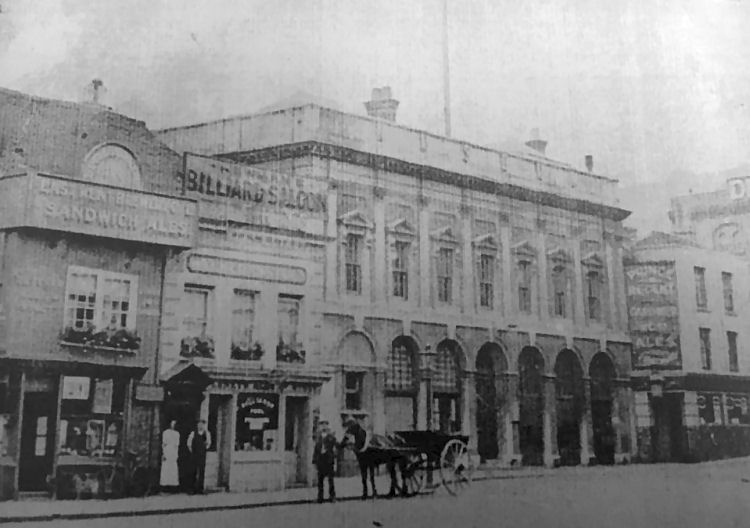
Above photo circa 1900, showing the "Duchess of Kent" left and the "Prince
Regent" right. |
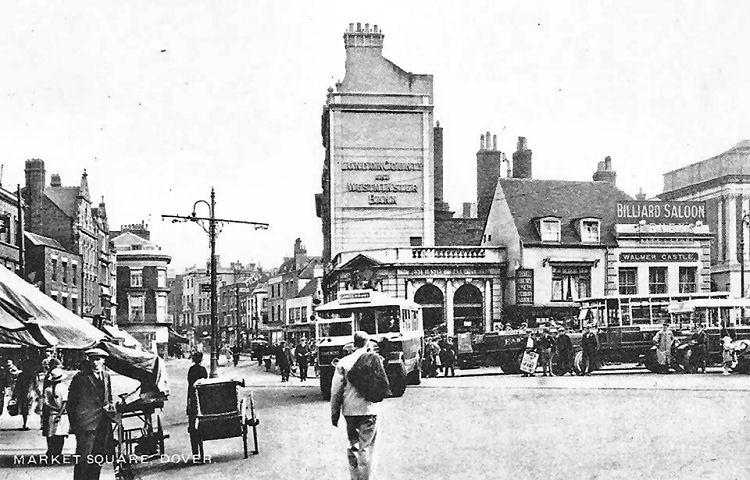
Above postcard, circa 1920, kindly sent by Paul Wells. |
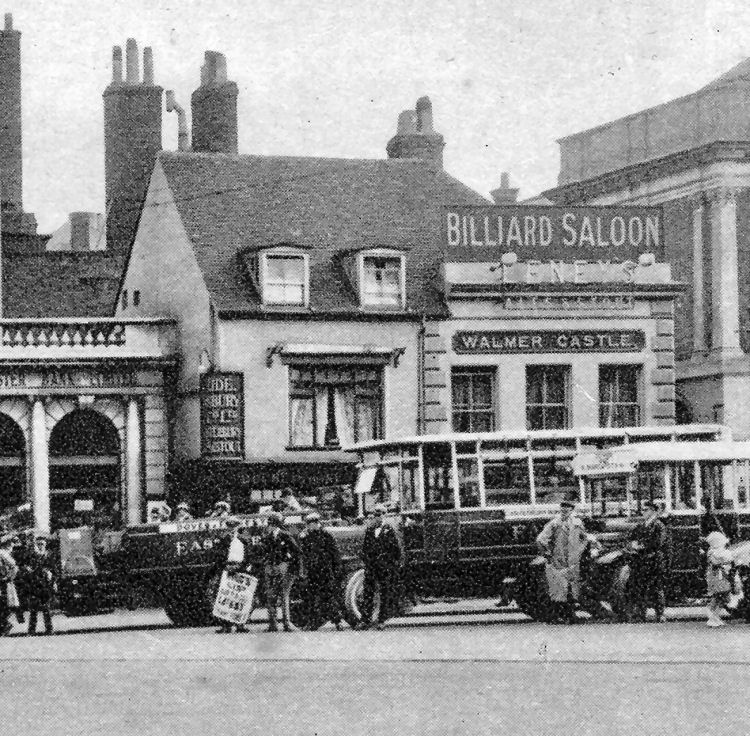
Above photo, circa 1930s, kindly sent by Graham Butterworth. |
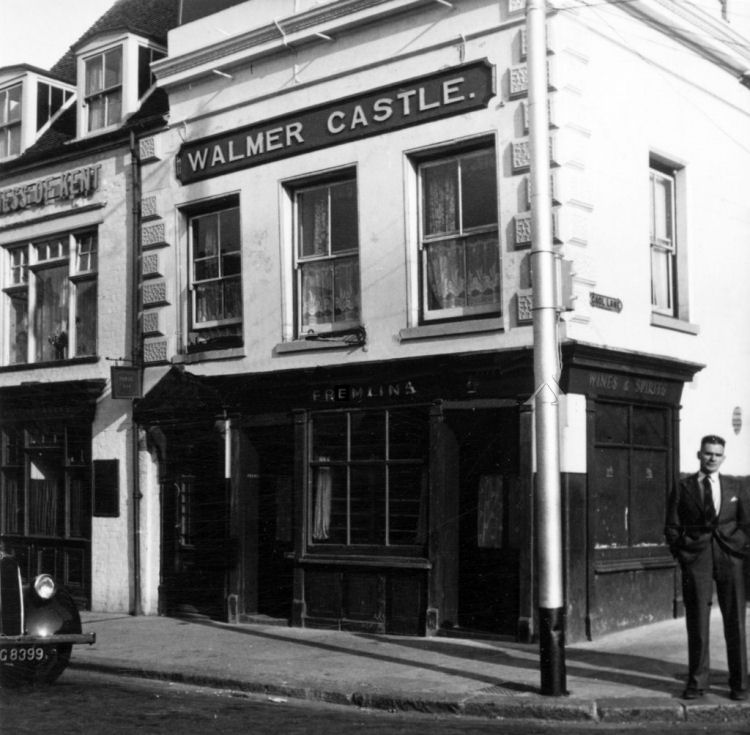
Above photo date circa 1950s? |
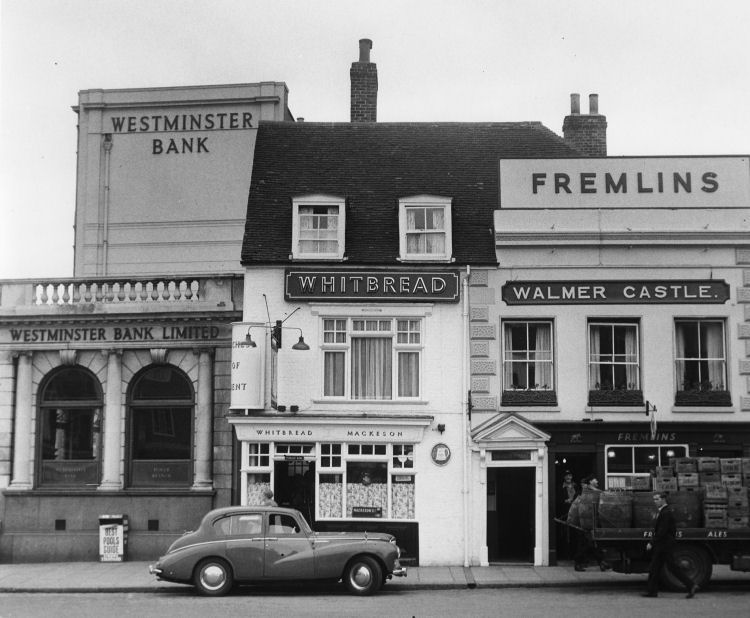 |
|
The Walmer Castle next door to "Duchess of Kent" circa 1960. |
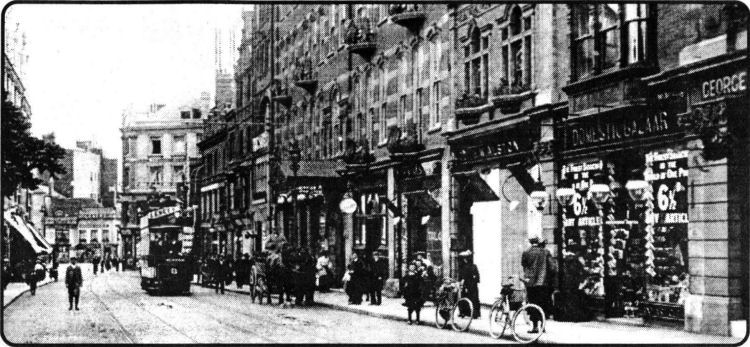
MEMENTOES of Dover Tramway: One of the first Dover trams,
car No 3, with open top deck heads for Buckland from the Pier terminus near
the Crosswall quay and is about to overtake a cart hauled by two horses
standing outside the Metropole Restaurant which was opposite St Mary's Church.
In the background can be seen the Duchess of Kent and Walmer Castle public
houses standing side by side near the King Street corner of the Market
Square. Behind the tram is believed to Waterloo House, the very distinctive
shop of Hart & Co Incorporating a very useful public clock. |
Supplied by Alfred Leney Co Ltd, who bought out Thomas Walker's Phoenix
Brewery in 1859 and registered as such in 1896, until bought out by Fremlin
Brothers brewery of Maidstone in 1926, brewing at the Dover brewery ceased
in 1927, which later passed to Whitbread.
They were re-designated when Dolphin House was built in 1954.
The original traded in 1729 but it had been known previously as the "Dolphin"
and the "Hare
and Hounds". Enlarged also at some time, because a next
door stable, afterwards used as a soup kitchen and a carpenter's shop, was
incorporated with this establishment.
|
From the Dover Telegraph and Cinque Ports General
Advertiser, Saturday 25 January, 1845. Price 5d.
The gentlemen and respectable tradesmen who meet at the "Walmer
Castle Inn," held their annual supper on Tuesday evening, when about
fifty sat down to a repast, which for variety, excellence, and
abundance, reflected great credit on the worthy young host, (Mr. Sympson,)
and his sister. The stewards had not been idle in their vocation, and
every arrangement for the evening's entertainment seemed to give the
greatest satisfaction. In consequence of the unavoidable absence, from
indisposition, of Mr. Vile, who has presided over these annual meetings
for a long series of years, Mr. Russell was appointed chairman, and the
remark is far removed from flattery when we say that the ability which
he displayed, and the easy manner in which he went through the various
duties of the chair have been rarely if ever excelled. The usual loyal
toasts were received with the accustomed honours; and as the enlivening
glass went round, toast, song, and sentiment afforded successfully an
intellectual and harmonious treat. In the course of the evening the
health of Mr. Vile was proposed by Mr. Kennett, and was drank with
enthusiasm.
|
|
Dover Chronicles 6 June 1846.
Fatal Accident At Sea.
We regret to learn that Thomas Williams, a youth age 15, second son
of Mr. Williams, of the "Walmer Castle" here, fell from the
mast-head of the schooner Queen, in a gale of wind, on her passage
to Leghorn, on the 21st of January last, and was unfortunately
drowned. Such was a state of the tempest at the time, that it was
found impossible to save the unfortunate youth. The above melancholy
intelligent reached Dover only on Thursday last; and, we need not
add, it has caused much distress among the family and friends of
deceased.
|
The name changed from the "Hare
and Hounds" to the "Walmer Castle" in 1791. It sold for £430 in 1809 and for £750 in 1851. The front was completely
renewed in 1822. Bagshaw's directory of 1847 lists and "Eating-House" in
Market Place and Joseph Robert Williams as the named tennent. This name also
crops up from Barry Smith's notes at the "Walmer Castle" of exactly the same
date, so I assume they are one and the same. Hence this pub was also
referred to as an "Eating-House" in 1847 and John Ray's advertisement in 1861 informed the public that hot joints were served daily from twelve until
two.
|
Kentish Gazette, 5 November 1850.
DOVER.
FREEHOLD PUBLIC HOUSE, in the Market Place; and LEASEHOLD HOUSES,
near the Railway Terminus at the Pier.
FOR SALE BY AUCTION.
AT the "Walmer Castle Inn," in the Market Place, DOVER, on MONDAY,
the 11th day of November at two o'clock in the afternoon.
The valuable FREEHOLD INN called the "Walmer Castle," most eligible
situate in the Market Place, DOVER, now and for many years in the
occupation of Mr. J. K. Williams.
Three small LEASEHOLD HOUSES, in Middle Row, at the Pier, near to
the Port and the Railway Termininus, DOVER, in the occupations of
Thomas Herbert, John Heath, and Peter Joseph.
The tenants will show the premises; and further particulars may be
known on application to Mr. Bass, Solicitor, Dover. |
In 1863 the premises of the Walmer Castle were used to hold the inquest
of the fire at the nearby Alhambra Music Hall. (Click
for details).
|
From the Dover Express and East Kent Intelligencer, 27
August, 1859.
DRUNKENNESS
Ellen Hand, was charged with being drunk, causing an obstruction, and
using obscene language, and further with wilfully breaking four panes of
glass at the "Walmer Castle Inn," Market Place.
Police-sergeant Back - Yesterday afternoon, between four and five
o'clock, a gentleman came to the police station and informed me that a
woman was drunk and breaking windows in the Market Place. I immediately
proceeded to the spot, where I found the defendant, who was obstruction
the footway in a state of drunkenness and in the act of breaking a pane
of glass. I then took her to the station-house. Her language was
obscene. There were four panes of glass broken.
The Bench fined defendant forty shillings; in default of paying which
she was committed to the house of correction for one month.
The defendant was committed for drunkenness only a fortnight since,
and consequently she had been released from prison but a few days.
|
|
Dover Telegraph and Cinque Ports General Advertiser, Saturday 22 December 1860.
Caution to Carvers.
On Thursday noon, as Mrs. Ray the landlady of the "Walmer Castle" Tavern
and dining rooms, Market Place, hurriedly took up the carving knife and
fork, admitted the usual precaution of raising the guard upon the
latter, and was cutting from one of the joints, the knife unfortunately
slipped, and severely cut her thumb and two fingers, one of which is
nearly severed. Great loss of blood ensued, but the wounds were speedily
bandaged, and we trust only a temporary inconvenience will ensue.
|
|
From the Dover Express and East Kent News, Friday 18
June, 1863.
VALUE OF GOOD CHARACTER
George Roney, an artilleryman belonging to the 2nd Brigade, quartered
at Dover Castle, was brought up by the police-constable Johnson, charged
with drunkenness and disorderly conduct, and with assaulting the
policeman in the execution of his duty.
Johnson said he was on duty on Saturday night, near the "Walmer
Castle Inn," when his assistance was asked by Mr. Ray, the landlord, for
the removal of the prisoner from his house. The prisoner was drunk, and
the proceedings caused a crowd to assemble. After he was got out,
prisoner went back to the house for his stick and gloves, which he got
without causing further disturbance, but as he was passing witness
struck him on the side of the head with the stick, and witness then took
him into custody.
The prisoner said he was sorry for having caused a disturbance, and
for his assault on the policeman; but the truth was he went into the "Walmer
Castle" to buy something to eat, and he was irritated at the landlord
not allowing him to stand at the counter to eat what he had purchased.
Magistrate: But you were drunk, and the landlord was not bound to
have a drunken man on his premises.
The prisoner said if he had not been under the influence of drink the
occurrence would not have taken place.
Lieut Smithett, the lieutenant of the prisoner's battery,
subsequently attended, and in reply to the magistrates said the
prisoner, although he had formerly been of indifferent character had
recently turned over a new leaf, and had behaved himself very well.
Prisoner said he would endeavour to keep a good character if the
Magistrates would look over this offence; and the police superintendent
having no desire to press the charge of assault, the Bench resolved to
give the prisoner opportunity of prosecuting that course of reform which
had now been unhappily broken, and dismissed him with an admonition.
|
|
Dover Express, Saturday, 22 August, 1863.
Coroner's inquest.
Last evening and inquest was held at the "Walmer Castle Inn," on the
body of John Bartlett, a journeyman hatter, living in New Street, who
had died on the previous night.
It appeared that the deceased, up to a fortnight since, was addicted to
excessive drinking, and was the victim of gout and asthma and after
hearing the evidence, the jury returned a verdict of "Death from natural
causes."
|
|
From the Dover Express, Hythe News, and East Kent Intelligencer,
Saturday, 29 October, 1864.
DRUNK AND DISORDERLY
James Hoskins was charged with being drunk and disorderly and
breaking a square of glass, value 2s., at the "Walmer Castle Inn,"
Market Square, and also with assaulting the landlord.
Defendant and a friend went into the "Walmer Castle Inn" on the
previous morning, about eleven o'clock, and had something to drink. They
were very noisy, and on their asking to be supplied with some more beer,
the landlord refused to serve them. He requested both men to leave his
house, and they did so, but the defendant, after getting outside, was
very abusive, and endeavoured several times to force his way into the "Walmer
Castle," and finally he struck the landlord and broke a square of glass
in the doorway.
The Magistrates ordered defendant to pay 2s., the amount of damage,
and a fine of 6s. and the cost. In all 13s.
The money was paid.
|
|
From the Dover Express and East Kent
News, Friday 14 May, 1869.
DRUNKENNESS
Henry Irons, a boatman, was charged with disorderly conduct in Market
Street on the previous Saturday evening.
Police-sergeant Johnson said that Mrs. Ray of the "Walmer Castle,"
having sent to the police-station, complaining of the defendant being in
a disorderly state in front of her house, he went to Market Square, and
found the defendant very drunk and wanting to fight. Witness advised him
to go home; but defendant refused , and persisted on entering the
"Phoenix." He afterwards came out and commenced fighting. The constable
then took him to the police-station.
On the urgent appeal of the defendant, the magistrates dismissed him;
but told him that if he appeared before them again he would be punished.
|
|
From the Dover Express and East Kent News, Friday,
May, 1869.
DRUNKENNESS.
John Cliff, a sailor, was charged with disorderly conduct in market
Square, and also with assaulting Mrs. Ray, the landlady of the "Walmer
Castle," but the prosecutrix not putting in her appearance, the case was
dismissed.
|
|
From the Dover Express and East Kent News, Friday,
11 February, 1870.
CORONER'S INQUIRY
An inquest was held at the "Walmer Castle Inn," Market Square, on
Saturday evening last before the borough coroner, W. H. Payn, Esq., and
a jury, of which Mr. Thomas Beeching was chosen the foreman, on the body
of a newly-born female infant, which had been picked up on the seashore
in front of the Baths near the Marine Parade, the same morning. It is
somewhat remarkable that the Coroner held a similar enquiry at the same
hour and place on the previous Saturday, on the body of a newly-born
child picked up within the railings of St. Mary's Churchyard.
Alfred Howland said he was a shipwright residing at 1, Paris Yard,
Dover. He was walking along the shore about a quarter before eleven the
same morning near to the bathing rooms, the water flowing at the time,
when he saw the body of the infant lying face downwards on the beach. He
picked it up, and carried it about twelve yards from the edge of the
water in order to prevent it being washed away. He then went and told
his fellow apprentice, who watched the body, while witness went to give
information to the police at the station-house. Witness returned to the
spot where he had left the body, in company with a policeman, who placed
it in a piece of canvas, and removed it to the police-station. Witness
did not notice any marks upon the child; but he noticed that it had
black hair. The infant was not wrapped up in anything; but was quite
bare. He believed it was a newly-born child.
It appeared that Police-constable Baker was the policeman who
accompanied the last witness to the beach to remove the child and that
Police-sergeant Stevens afterwards took it to the surgeon for
examination.
Mr. James Robert Crawford said he was a member of the Faculty of
Physicians and Surgeons of Glasgow, and was practising in Dover in
partnership with Mr. Walter. The same morning, about half-past twelve,
the deceased child was brought up to his surgery by the police for
post mortem examination, so that it might be ascertained whether it
was born alive or not. Upon external examination, he discovered a large
bruise on the forehead, and saw that the nose was disfigured. The lungs,
he found, floated in water, proving that the child had been born alive.
Decomposition was advanced. He believed the bruises on the forehead
might have been caused by the child having fallen on any hard substance.
Witness was not certain whether the blow was received before or after
death. Necessary attention had not been rendered at birth of the child,
and this of itself would have been sufficient to cause death.
By the foreman of the Jury: I should say that the body of the child
had been in the water for about thirty hours.
By the Coroner: The blow on the head would have caused the death of
the child.
By the Jury: The child is fully developed. Decomposition would ensue
in thirty hours, and would take place all the more rapidly through
exposure to the air and water.
The Jury retired for a short time, when they arrived at the
conclusion that the child's death had been ensued through wilful neglect
at its birth, and earnestly requested the police to make every exertion
to bring the guilty party to justice.
|
|
From the Dover Express and East Kent Intelligencer,
23 September, 1870. Price 1d.
A STURDY CRIPPLE
John Smith, a middle-aged man who had been deprived of both his legs,
but who with the aid of crutches moved about very nimbly on his stumps,
and who was dressed in the garb of the British Tar, was charged with
drunkenness and disorderly conduct in the Market Place, and assaulting
the police in the execution of duty.
Police-sergeant James Johnson said his attention was called to the
prisoner about half-past six o'clock on the previous evening. He found
him in the Market Place, in front of the "Walmer Castle Inn," where he
had collected a large crowd, which obstructed the footpath. Witness saw
that he was drunk; and he advised him to go home to his lodgings. He
said he would, and was absent for about ten minutes; but at the
expiration of that time he again returned and conducted himself in such
a way as to cause a crown again to assemble. Witness again insisted on
his going away; but he would only move off the footpath into the road,
where he brandished one of his crutches, and set the police at defence.
He still wished him to go away without bother, and was going towards him
to try to persuade him to go, when he flourished his crutch, and brought
it down on the lower part of his (witness's) legs with considerable
violence. Police-constable Mick came up at the same time, and prisoner
struck him with his crutch also. Witness then took him to the
police-station, where his conduct was very violent.
The man had nothing to say in answer to the charge; and the
Magistrates sent him to gaol for a month, with hard labour.
|
|
Dover Express 02 October 1874.
LICENSING BUSINESS.
Mr. Worsfold Mowll applied that permission to open at 5 a.m. might be
granted to Stephen Castle of the "Friend-in-Need," Peter Street. There
was a memorial from the men in the employ of Crundall, Chitty, and S. R.
Elms, and moreover the house had formerly opened at five. Applicant had
been in the house over five years, and had borne an irreproachable
character. Under the section of the Act of Parliament the Bench had
power to grant the application, if the house had formerly opened early,
and if they thought it was necessary for the convenience of workmen and
others.
Mr. Dickson said it must be shown that the house had always opened early
previously to the passing of the Act.
Castle said it always had opened at five.
Mr Mowll, continuing, said the house was at the entrance to Mr.
Crundall's workshops.
Mr. Jones:- Pardon me, it is a cottage in the middle of Peter-street,
with an entrance in Colebran-street.
Mr. Dickeson said he understood Mr. Mowll had another similar
application. It would be better for the Bench to decide on both at the
same time.
Mr. Mowll said he had also to apply on behalf of Mrs. Whiting, of the
"Walmer Castle," for permission to open at five a.m. for the convenience
of market gardeners and other. The house next door the "Duchess of
Kent," opened early now, and as that and the "Walmer Castle" were both
in the same position and both had before the passing of the last Act,
opened early, one had as much right to do so as the other.
Mr. Dickeson:- Did not the "Walmer Castle" apply on Licensing Day and
got refused?
Mr. Stilwell:- The application was to upon at half-past three.
Mr. Mowll:- This is simply an application for an extra hour.
Mr. Dickeson:- You can't urge the necessity of the application if, as
you say, the house next door opens early.
Mr. Mowll:- I would only point out this; that the two houses have,
previously to the passing of the Act, both opened early, and that it was
simply through the application not being, by an accident property urged
on Licensing Day that the Bench did not grant it then. Both have kept
open early before, and if you have granted a continuance of the
privilege to one you must in justice grant it to the other. If the
opening of this in the morning encouraged drinking or drinking habits I
would not come before you to urge the application.
Mr. Jones:- I think the Bench have to study only the question of public
convenience. If the house
next door in open there in no necessity for your application.
Mr. Mowll:- Have they not also to consider what is right towards the
person who holds the licence?
Mr. Dickeson:- Have you any application besides these two?
Mr. Mowll:- If the bench are against me I have not. I had thought that
the Bench laid down the rule that where a house had formerly opened
early they would renew permission. The question arose in the application
for the "Mechanics' Arms." When adjourned to Broadstairs it was proved
that the house had opened early previously, and the application was
granted; and I am instructed that this house has always been open at
five. As to there being two houses together some people might require a
different sort of beer to that supplied at the "Duchess of Kent."
Mr. Jones said that if Mr. Mowll's principles were carried out all the
houses in the town would open early.
Mr. Mowll:- You urge the matter farther than I urge it. I think the
applicant has an equal right to the people next door.
Mr. Jones:- The question is whether it is necessary for the convenience
of the people attending the market.
Mr. Mowll:- And whether justice is done to the applicant and the
requirements of the public are met.
Mr. Stilwell:- The Bench might grant the same application for every
house in the town.
Mr. Mowll:- No, there are only a few that opened early previously.
Mr. Dickeson:- We have carefully considered the matter of these two
applications, and we come to the conclusion that you have failed to
establish in our minds the necessity of opening these houses at an
earlier hour than required by the Act. Therefore we decline to grant
your application.
|
|
From the Dover Express and East Kent News, Friday,
4 February, 1876. 1d
ASSAULT AND DESTRUCTION
Alfred Richards was charged with assaulting the landlord of the "Walmer
Castle," breaking a window, and doing damage to the amount of £1.
The Bench fined prisoner in all £2 2s. which was paid.
|
|
From the Dover Express and East Kent Intelligencer, 26 March, 1880. Price 1d.
MEETING AT THE WALMER CASTLE INN
A large and most enthusiastic meeting of the Town Ward electors was held
in the club room at the “Walmer Castle Inn,” on Turesday evening at nine
o'clock. The room was crowded, and many were unable to gain admittance.
The chair was taken by Mr. J. Bradley, supported by the Liberal
candidates, C. Clement Walker, Esq., and the Hon. Philip Stanhope,
Messrs. Rowland Rees., C. K. Worsfold, T. Viney Brown, E. P. Robinson,
T. Lewis, H. Hayward, H. M. Baker, Mr. Ethelbert, Mr. Evans, Messrs. J.
Agate, J. Parton, T. H. Sutton, J. Struckett, W. J. Pettitt, E. Holder,
J. Vidler, B. Coveney, &c………….
|
|
From the Dover Express and East Kent News, Friday 15 May, 1885. Price 1d.
DRUNK AND DISORDERLY
Fred Richards was charged with being drunk, disorderly, and using
obscene language in Adrian Street on Saturday night.
Police-constable Bass said: On Saturday night, about nine o'clock, I was
on duty in the Market Square, and was called by the landlord of the
“Walmer Castle” to a disturbance at his house. I saw defendant there,
and told him to go away. He then went into Bench Street and made use of
bad language. He afterwards went into Adrian Street into the
“Northampton Arms.” I cautioned the landlord not to serve him. Defendant
came out in the street again, and I took him into custody.
Fined 5s. and costs.
|
Four a.m. opening was allowed from 1875, (perhaps a year sooner), and it
held a special distinction in 1914 when all licensed premises and clubs,
with the exception of the "Walmer Castle", the "Duchess of Kent" and the
buffets of the town and harbour stations had to close at nine p.m.
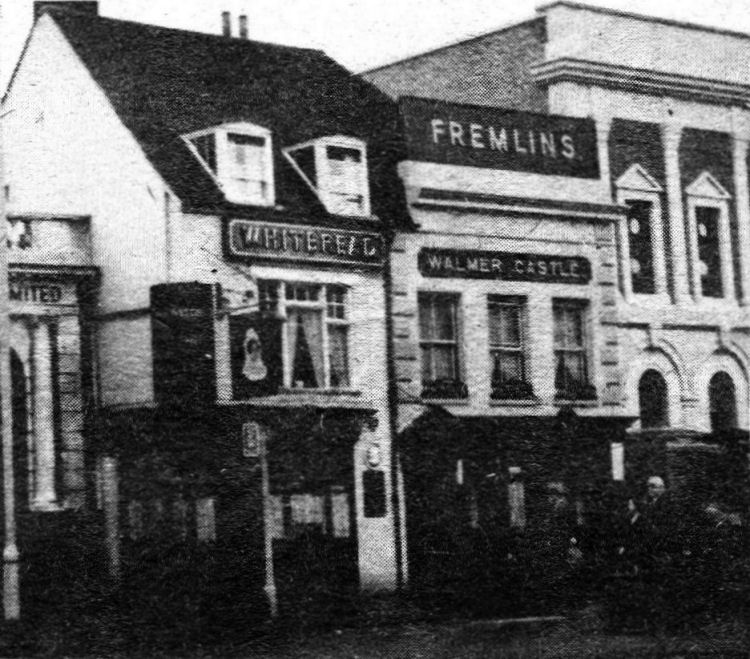 |
|
The old Duchess of Kent and Walmer Castle public houses in 1955 before
they were merged to become the Elephant and Hind.
Information taken from John Bavington Jones' book "A
Perambulation of the Town, Port and Fortress of Dover", 1906. (Reprint
in The South Kent Gazette, July 4th, 1979. |
Oddly enough, those same two pubs, which stood together, agreed to merge
in 1962. The structural alterations necessary to make that possible,
defeated the best of builders and virtual demolition and rebuilding of the
whole ensued.
It reopened as the "Elephant and Hind" in October 1964 as an outlet of Fremlin and Mackeson. The name being an amalgamation of the signs or
corporate identities of the two brewers respectively.
|
From the Dover Express and East Kent News, Friday, 8 November, 1889. Price 1d.
FIRE AT THE WALMER CASTLE INN
Last night a little before ten o'clock, there was an alarm of fire in
the Market Place and it was found that the attics of the “Walmer Castle
Inn” were on fire. The brigade was soon on the spot and a vast crowd
collected. A hose was taken inside and another to the top by means of
the fire escape. It was soon got under. Considerable damage was done.
|
|
Dover Express 18th May 1900.
DRUNK WHILE IN CHARGE OF A HORSE.
Henry Hampton was charged with being drunk whist in charge of a horse in
the Market Square.
Police Constable Spinner said that, on the previous afternoon about
3.15, he saw defendant come down Cannon Street riding on a big cart
horse, which was going at full trot. He went through the Market and
stopped outside the "Walmer Castle Hotel." He went into the house but,
when witness got there, the defendant came out again. He had left the
horse unattended. He was assisted on to the horse by a bystander. Seeing
that the defendant was drunk, witness told him to get down off the horse
and lead it. Defendant, instead, took hold of the reins and hit the
horse with them across the shoulders. The horse trotted off into the
centre of the Market Square where the defendant fell off, rolling under
the horse. Witness then took him into custody.
A fine of 5s, including costs, was inflicted.
|
|
From the Dover Express and East Kent News, Friday, 26 January, 1906. Price 1d.
TRANSFERS
Plans for alterations to the “Walmer Castle” so that a door might be
made for the private portion of the house were approved and also for the
construction of a club room at the “Beaconsfield Arms,” Adrian Street.
|
|
From the Dover Times, July-August 1913.
DRUNK AT EIGHTEEN.
At the Dover Police Court on Monday, before Mr. M. Pepper (in the chair)
Capt. R. B. Cay, R.N., Messrs. Edward Chitty and G. C. Rubio.
Francis Allen Foord, aged 18, of Percival-terrace, was charged with
being drunk and disorderly in the Market-square.
P.O. Husk said: On Saturday evening, about eight o’clock, I was on duty
in the Market-square, and was called by the landlord of the "Walmer
Castle" to prisoner, who was in his bar drunk. The landlord requested
him to leave, but he refused, and a friend took him away. About 8.30 I
was again called to the same house, and had to put prisoner out. At 9.15
I had to eject him again. As he went back to the "Walmer Castle" I
arrested him.
Prisoner said he was a coal trimmer on board ship.
Capt. Cay: What is your age?
Prisoner: Eighteen year, sir.
Capt. Cay: You have started early.
Mr. Newman, landlord of the "Walmer Castle," said he was called to the
saloon bar, where he saw prisoner with two or three others, playing with
an automatic piano. He told them to leave, and as they refused he put
them out. As Prisoner came back he called P.C. Husk's attention to them.
Prisoner's mother said her son was a good boy until a short time ago,
when he became associated with bad companions.
Prisoner was fined 12s., with costs, or in default seven days.
|
|
From the Dover Express and East Kent News, Friday, 2 March, 1917.
ADJOURNED LICENSING SESSIONS
The license of the “Walmer Castle,” Market Square, was transferred from
Mr. J. Jolly to Mr. G. Wood (Messrs. A. Leney and Co's agent).
|
|
From the Dover Express and East Kent News, Friday, 18
August, 1933. Price 1½d.
LICENCE TRANSFER SESSIONS
Mr. Wood, of the "Walmer Castle," was granted an occasional licence from
7 p.m. to 1 a.m. on 16th August, at the Town Hall, for a dance
organised by the Man of Kent and Kentish Men. he was also granted a licence
for a marquee at the Dover Hospital Fete, in Pencester Gardens, on 23rd and
24th August.
|
|
From the Dover Express and East Kent News, Friday, 22 March, 1935. Price 1½d.
OCCASIONAL LICENSE
The licence of the "Walmer Castle," Dover was granted as occasional
licence to sell in the marquee at Knowlton, from 11 a.m. to 6 p.m. on the
occasion of the West Street Point to Point Races, on Saturday, March 23rd.
|
|
From the Dover Express and East Kent News, Friday, 3
April, 1936.
WINGHAM PETTY SESSIONS
The license of the "Walmer Castle," Dover, was granted an occasional
licence to serve in a tent at Knowlton Park from 11 a.m. to 5 p.m. on April
9th, on the occasion of the Royal Marines' regimental point-to-point
steeplechase meeting.
|
LICENSEE LIST
WILLIAMS Joseph Robert 1840-50+
 ( ( Eating
house) Eating
house)
GEORGE William 1854-58+  ( ( Eating
house) Eating
house)
RAY John 1860-July/67 dec'd (age 36 in 1861 ) )

RAY Jane Mrs July/1867+

PHIPPS John 1874
PHIPPS Mrs 1874 (Walmer Castle Hotel)
WHITING Mrs Ann 1874
HAMBROOK Duboyce Aug/1874-82+ (age 27 in 1881 ) )
 
OVENDEN William 1885+
 WRIGHT William Henry 1885 WRIGHT William Henry 1885

KILBY Alfred 1891

ELPHINSTONE Alfred
 1891-Sept/1904
(age 45 in 1901 1891-Sept/1904
(age 45 in 1901 ) )
     
 NEWMAN Mr A T Sept/1904-Dec/13
NEWMAN Mr A T Sept/1904-Dec/13
 (Licensed
Victualler of Folkestone) (Licensed
Victualler of Folkestone)
 JOLLY Henry Dec/1913-Feb/17
JOLLY Henry Dec/1913-Feb/17

WOOD Mr G P Feb/1917 temporary transfer (manager for Leney & Co)

LEWIS David 1917-22+
 
DAWSON R E 1924

WOOD George Henry 1925-30+

Dover Licensed Victuallers' Manager Apr/1932+

EVANS F 1932+

WOOD Mr 1934+
HEMSLEY Raymond 1937-38+
 
 HENDY Fred William 1941
HENDY Fred William 1941 
FULLAGAR A F 1948-53
  
COPLEY Ernest Leo 1951?-59

 
 From the Pigot's Directory 1840 From the Pigot's Directory 1840
 From Bagshaw Directory 1847 From Bagshaw Directory 1847
 From the Post Office Directory 1882 From the Post Office Directory 1882
 From the Post Office Directory 1891 From the Post Office Directory 1891
 From Pikes Dover Blue Book 1895 From Pikes Dover Blue Book 1895
 From the Kelly's Directory 1899 From the Kelly's Directory 1899
 From the Post Office Directory 1901 From the Post Office Directory 1901
 From the Post Office Directory 1903 From the Post Office Directory 1903
 From the Kelly's Directory 1903 From the Kelly's Directory 1903
 From the Post Office Directory 1922 From the Post Office Directory 1922
 From Pikes Dover Blue Book 1923 From Pikes Dover Blue Book 1923
 From Pikes Dover Blue Book 1924 From Pikes Dover Blue Book 1924
 From the Post Office Directory 1930 From the Post Office Directory 1930
 From Pikes Dover Blue Book 1932-33 From Pikes Dover Blue Book 1932-33
 From the Post Office Directory 1938 From the Post Office Directory 1938
 From Pikes Dover Blue Book 1938-39 From Pikes Dover Blue Book 1938-39
 From Pikes Dover Blue Book 1948-49 From Pikes Dover Blue Book 1948-49
 From the Kelly's Directory 1950 From the Kelly's Directory 1950
 From the Kelly's Directory 1953 From the Kelly's Directory 1953
 From the Kelly's Directory 1956 From the Kelly's Directory 1956
 From the Dover Express From the Dover Express
 From the Dover Telegraph From the Dover Telegraph
|






